

LEANING TOWER OF PISA
BBHS under new SH

MAJA S. MARTINEZ
Baras - Baras High School gains a new leader in the person of Ma’am Luzvi P. Concepcion from Burot Integrated School effective January 6, 2024 as she switches schools with outgoing school head, Dr. Mamerto L. Ragel, Jr.
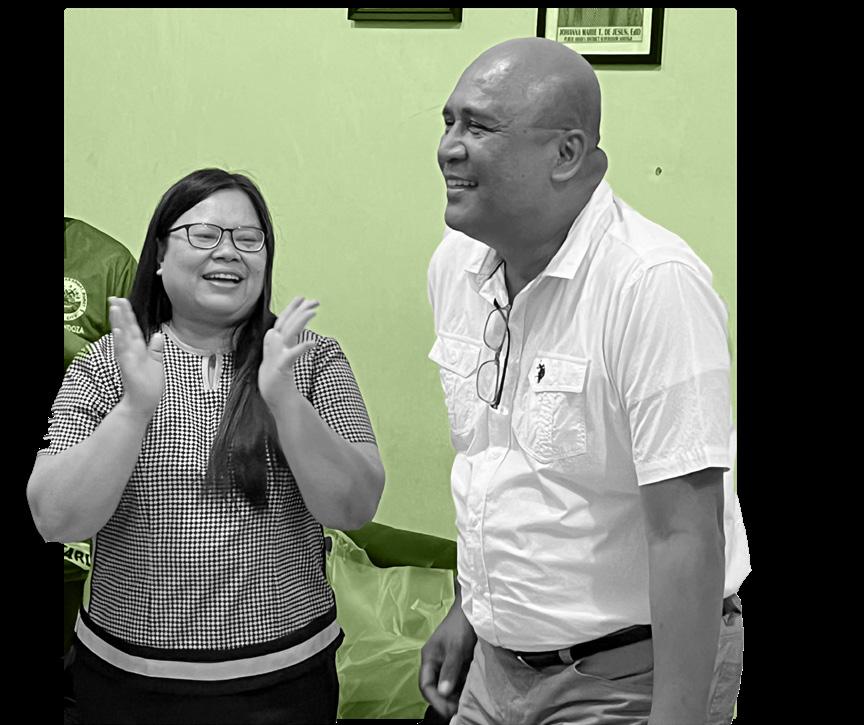
Catch-up or Cover Up?
Purrfect Friendship
G12 studes speak at multiple int’l research meet

TIFANIE A. BAGSIC
The grade 12 senior high school students of BarasBaras High School presented their respective research findings at multiple international conferences this year -- earning recognitions from multiple higher education institutions like De La Salle University, Polytechnic University of the Philippines and University of the Philippines Diliman.
Ms. Alexzandra Zhain Tampus and Ms. Lara Althea C. Quiambao of Grade 12 Orwell went to Baguio City for the 7th International Conference on Asian and Philippine Studies...


scan here


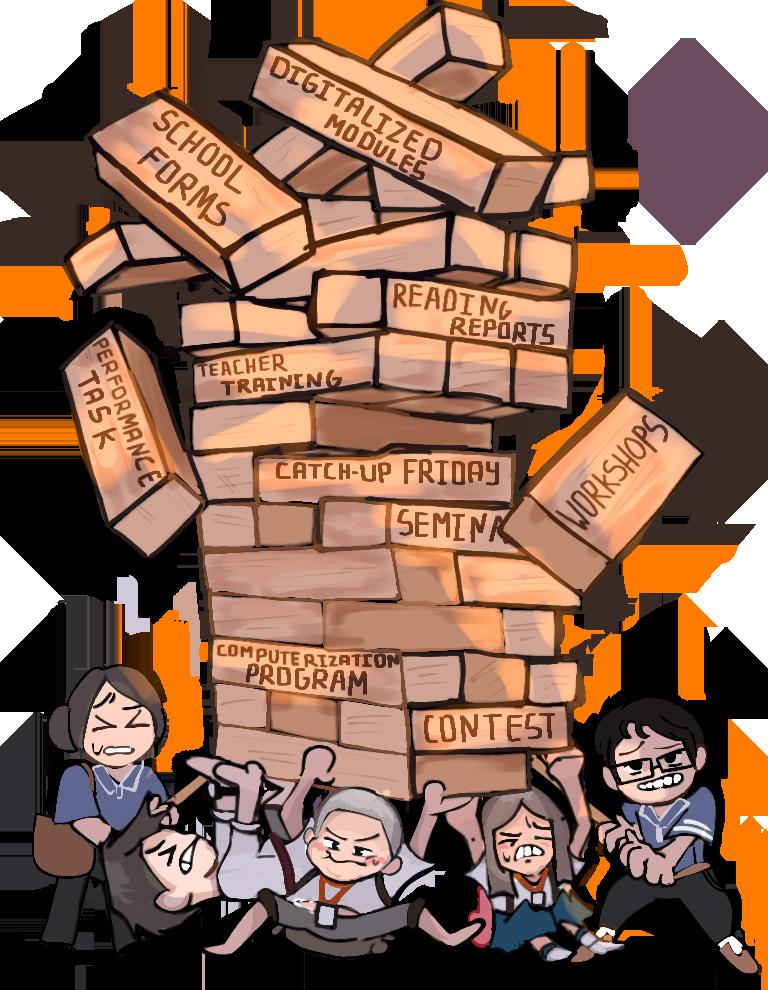
TRIUMPHS
BBHS RB wins a podium finish; places 3rd in DSPC

The Baras - Baras High School Radio Broadcasting team in English wins a podium finish against 15 other teams from Tarlac City public and private schools in the recently conducted Division Schools Press Conference (DSPC) held at Tarlac Montessori School (TMS) last January 23, 2025.
BBHS lands in 3rd place, joining TMS and Don Bosco Technical Institute who won 1st and 2nd place respectively.
This is the second time the BBHS radio broadcasting team joins DSPC, placing in 7th place last year.


BY THE NUMBERS
The Philippine education system has long faced struggles in delivering quality learning for all students. Recognizing the urgent need for change, the second Congressional Commission on Education (EDCOM II) was formed in 2023 to reassess the country’s education system and find ways to fix its problems.
With its focus on major reforms, EDCOM II aims to identify gaps and propose lasting solutions. By making smart and sustained improvements, this initiative has the power to shape a better future for education in the Philippines.
FAILING KIDS BEFORE THEY EVEN START
One of the biggest problems in education is Early Childhood Care and Development (ECCD), which still
faces many challenges. Many Filipino children suffer from poor nutrition, stunted growth, and lack of access to early learning. Studies show that while 23% of children benefit from the Department of Social Welfare and Development’s (DSWD) Supplementary Feeding Program, only 28% of them actually need it. Shockingly, the program has shown little to no impact, as the children’s energy levels remain the same as those who don’t receive aid.
Adding to this problem is the
wrong belief of many parents that kids under five are “too young” for school. Research proves early education is crucial, yet 97% of parents think otherwise. Some children do get early learning at home, with 50% of those aged 3-4 involved in reading activities.
Baras - Baras High School students take a stand on their comments in the implementation of Catch-up Friday in the school.
Of 252 respondents:
58% believes that the implementation of Catch-up Friday in BBHS is effective.
42%
believes that the implementation of Catch-up Friday in BBHS is ineffective.

BEYOND BARAS
CAMPUS BITS
LOWELLA J. BASAS
TURNOVER. Ma’am Luzvi P. Concepcion (left) and Dr. Mamerto L. Ragel, Jr. (right) share a laugh during the turnover ceremony at the Baras - Baras High School
LIAN R. LAMBANICIO

Basas wins 2nd place in 1st MIL presentation tilt

MAJA S. MARTINEZ
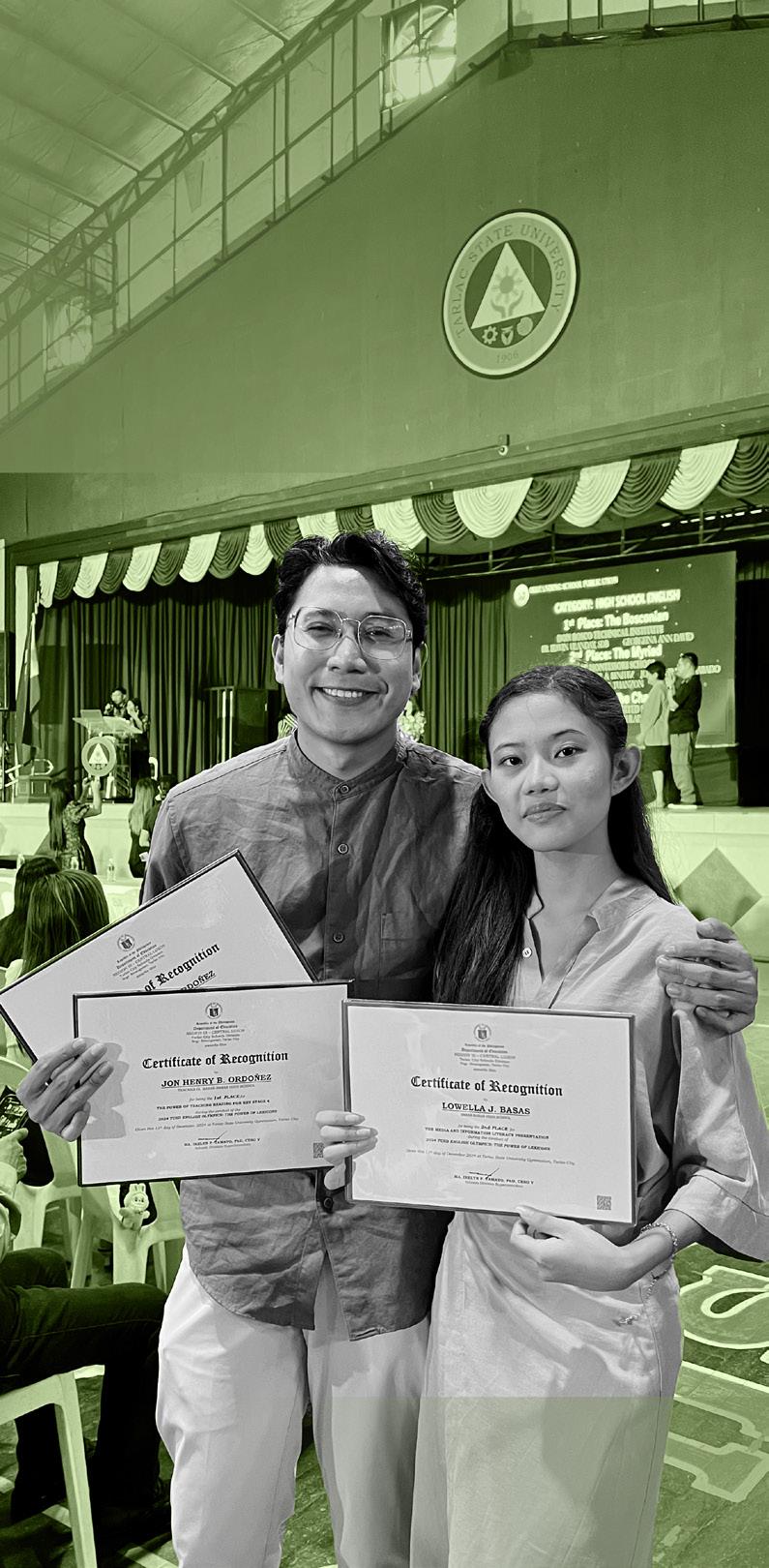
LOWELLA Basas of Grade 12 Orwell placed in 2nd during the first divison-wide contest on media and information literacy presentation and was awarded during the Education Week last December 11, 2024 at Tarlac State University Gymnasium.
“It was a humbling experience competing with bigger schools than us so when I heard she placed second, I was really amazed
TRIUMPHS
that the judges recognized our trainings for this competition.” said her coach, Sir Jon Henry B. Ordonez.
The contest is part of the English Olympics during the National Reading Month Celebration last November 2024. The activity aims to showcase the learners’ ability to engage with media technology and present a discussion on information literacy.
BBHS teachers top demo teaching tilt

LOWELLA J. BASAS
BARAS - BARAS High School teachers, Sir Jon Henry B. Ordonez and Ma’am Carmela H. Sumaoang receive recognition on their prowess in teaching reading as part of the English Olympics of Tarlac City Schools Division.
Ma’am Carmela placed second in the demonstration teaching of reading for junior high school while Sir Jon topped the senior high school teaching reading demonstration.
PED TALKS
WOKE MENTALITY
PBBM vetoes anti-teen pregnancy bill

TIFANIE A. BAGSIC
PRESIDENT Ferdinand R. Marcos, Jr. vowed to veto a bill to prevent teen pregnancy through a comprehensive sex education campaign, claiming that it promotes “woke mentality.”
He made reference from the claim of conservative group, Project Dalisay under former Chief Justice Maria Lourdes P.A. Sereno that ,”the bill seeks to teach kids how to masturbate -- a claim that has been debunked.
In response to the President’s actions, the bill author, Senator Risa Hontiveros reiterated that nowhere in the bill is childhood masturbation mentioned.
“Mr. President, with all due respect, it’s clear that there is no such word as masturbation in the bill,” she said in a video statement.
Sen. Hontiveros also said that the Project Dalisay’s claims were fake news.
RESEARCH
FROM PAGE 1 ...on June 2024 to share their insights on Victoria Tarlac farmers’ narratives and those of Tarlac City citizens re: economic disparities. This event was organized by De Lasalle UniversityManila.
Meanwhile, Ms. Lowella J. Basas and Ms. Maja S. Martinez of Grade 12 Orwell took part on the 5th International Research Webconference on November 2024 -- sharing their findings on Tarlac City Schools Division’s Project RESCUE 2.0 and narratives of campus journalists of Tarlac City North B district. This was organized by the Polytechnic University College of Education.
“I was just busy clapping for those who were called during the awarding, not knowing that I’ll come in first place. What was on my mind at the time is to get it done and be back to school and do my work,” Sir Jon when asked how he prepared.
G7 educators meet for MATATAG LCs

MAJA S. MARTINEZ
GRADE 7 teachers congregate for the unpacking of learning competencies of MATATAG curriculum on August 31, 2024 at the Baras - Baras High School Conference Hall.
The plenary sessions were divided into three groups with Ma’am Menchie Palara and Ma’am Fides Bondoc facilitated the English, Math, and Science departments.
Meanwhile, Ma’am Brenda Mag-
day, Ma’am Daisy Semillano, and Sir Loviegie Lampa facilitated the Filipino, ESP, and MAPEH departments. Lastly, Ma’am Aurora Tan and Ma’am Carolina Manaloto facilitated the TLE and AP departments.
This initiative aims to align the practice of the teachers in crafting daily lesson logs (DLL).
The sex education curriculum will tackle “human sexuality, informed consent, adolescent reproductive health, effective contraceptive use, disease prevention, HIV/AIDS, sexually transmitted infections, gender sensitivity, gender equality and equity, teen dating, gender-based violence, sexual abuse and exploitation, peer pressure, women’s and children’s rights and issues like pornography.”
MEETS
Lastly, Mr. Harvey Robert R. Gambuta and Mr. Jady S. Andriade presented their papers at the International Conference on Philosophy of Education and Values Education on December 2024 -sharing their discoveries in interviewing persons deprived of liberty (PDLs) in Tarlac Provincial Jail and residents of Tarlac City Lingap Center. This event was organized by University of the Philippines Diliman.
They were all accompanied by their research adviser, Sir. Jon Henry B. Ordonez in presenting their outputs on his subject, Practical Research 1.
PROJECT RESCUE
“It’s one thing for me to give them grades on their outputs and it’s another for outside academic institutions to validate their research. I believe the goal of every research output is to be shared to the public and what better way to do that than to encourage them to submit and have the opportunity to share their findings through these conferences. I take pride in knowing that people bigger than themselves acknowledge what they did and they rub elbows with esteemed researchers from different academic institutions. I will surely continue this culture in Baras - Baras High School,” said Mr. Ordonez in an interview.
DIAGNOSTICS
BBHS conducts comprehensive

It is a travesty of what sexual and sex education should be to the children. If this bill is passed in that form, I guarantee all parents, teachers, and children: I will immediately veto it.
‘‘I take pride in knowing that people bigger than themselves acknowledge what they did and they rub elbows with esteemed researchers from different academic institutions.
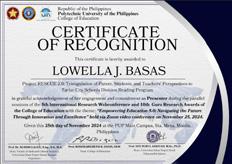
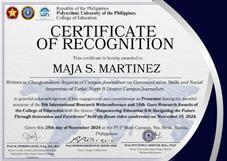
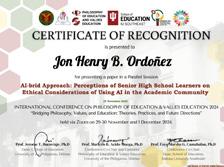
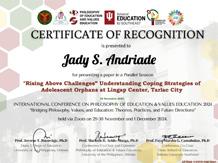
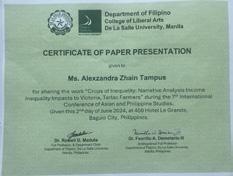
reading assessment

LOWELLA J. BASAS
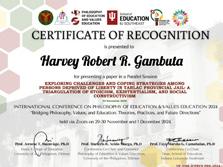
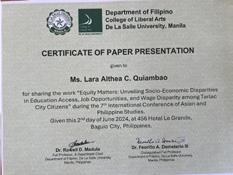
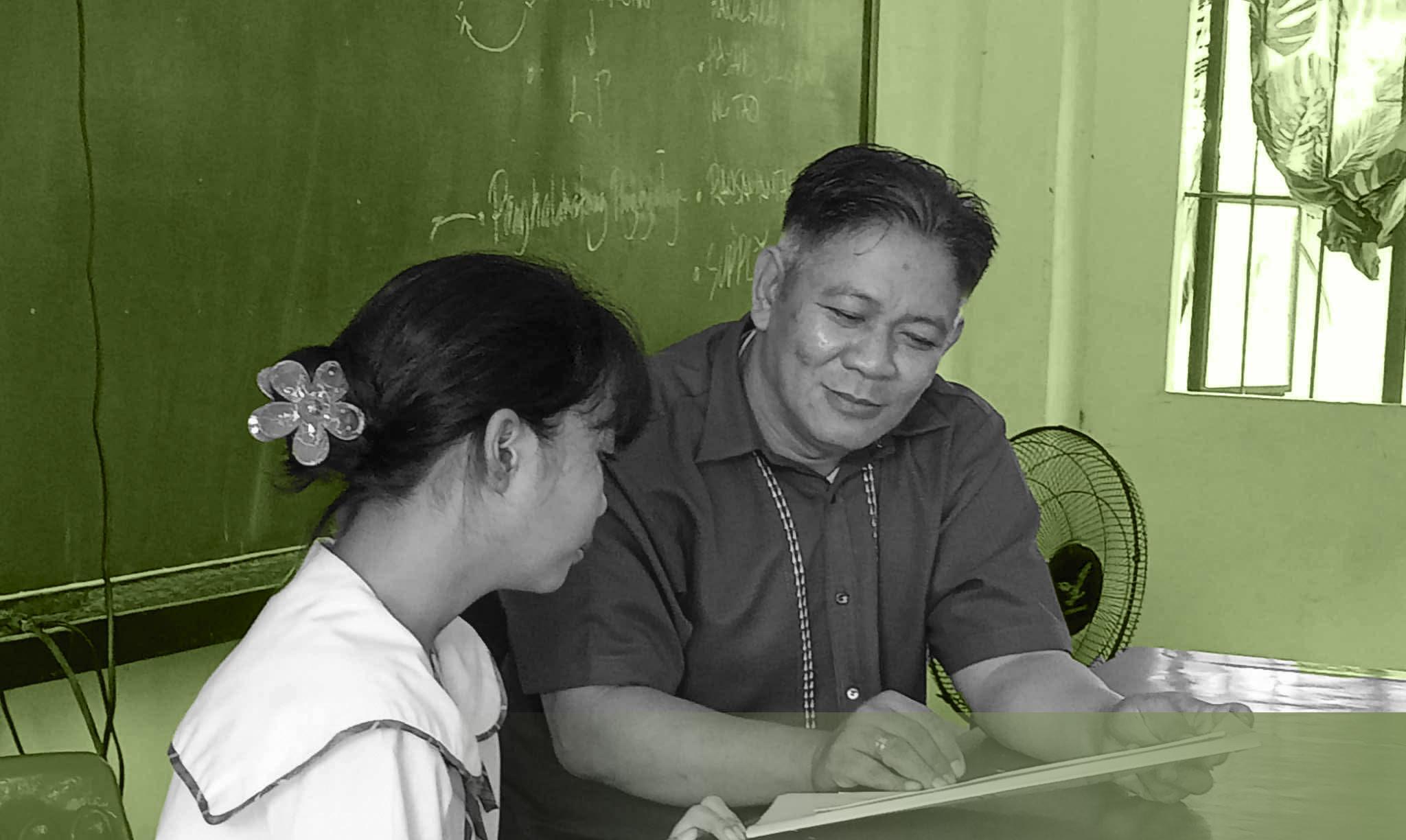
BARAS - BARAS High School recently conducted a comprehensive reading assessment for its Junior High School (JHS) and Senior High School (SHS) students as part of the Division Memorandum No. 256, s. 2024, issued by the Tarlac City Schools Division.
This pretest was designed to gauge the students’ reading performance and evaluate their comprehension abilities, and identify children who required additional support.
Of the 629 students assessed, the results indicated that a large percentage of students are reading at an independent level, with 43% of those assessed falling into this category. On the other hand, 41.17% of the students were at the instructional level, suggesting the need for guided reading support.
Meanwhile, a smaller portion of the student population was categorized under frustration and non-decoder levels, highlighting
those who face considerable challenges in reading and comprehension.
JHS’s reading chairperson, Ma’am Carmela Huna, noted “some students struggle to read simultaneously, while others struggle to follow and understand English.”
She also underlined that English teachers should concentrate on improving comprehension without putting undue pressure on their students during
reading sessions.
Additionally, Ma’am Annaliza Sison the Senior High School reading chairperson, observed that many students fall under the instructional and frustration categories. “They may either have problems with reading, comprehension, or both areas,” she noted.
The school plans to implement targeted strategies, including enhanced reading programs and close monitoring of students’ progress, to address these challenges and support students in improving their reading skills.
BEYOND BARAS
BEYOND BARAS
BBHS scribes go to UP; attend journalism summit

MARK LORENZ S. PINEDA
BBHS students, Mikaella H. Luanzon, Lowella J. Basas, Maja S. Martinez, along with campus journalists around Luzon attended Dyaryologue: Journalism Summit 2024 last May 26, 2024 organized by the Union of Journalists of the Philippines at the University of the Philippine Diliman
Among talks on journalism foundational skills, a segment on Mobile Journalism was also given focused -- a medium that The Sentinel shall venture on in the
next school year.
The BBHS delegates rubbed elbows with notable people industry such as Mr. Marc Jayson Cayabyab who is currently a reporter for The Philippine Star, specializing in coverage of the Philippine Senate and Ms. Jacque Manabat who is currently an independent multimedia journalist and content creator. She worked at ABS-CBN News as a senior multiplatform journalist, executive and associate producer, and news reporter; and
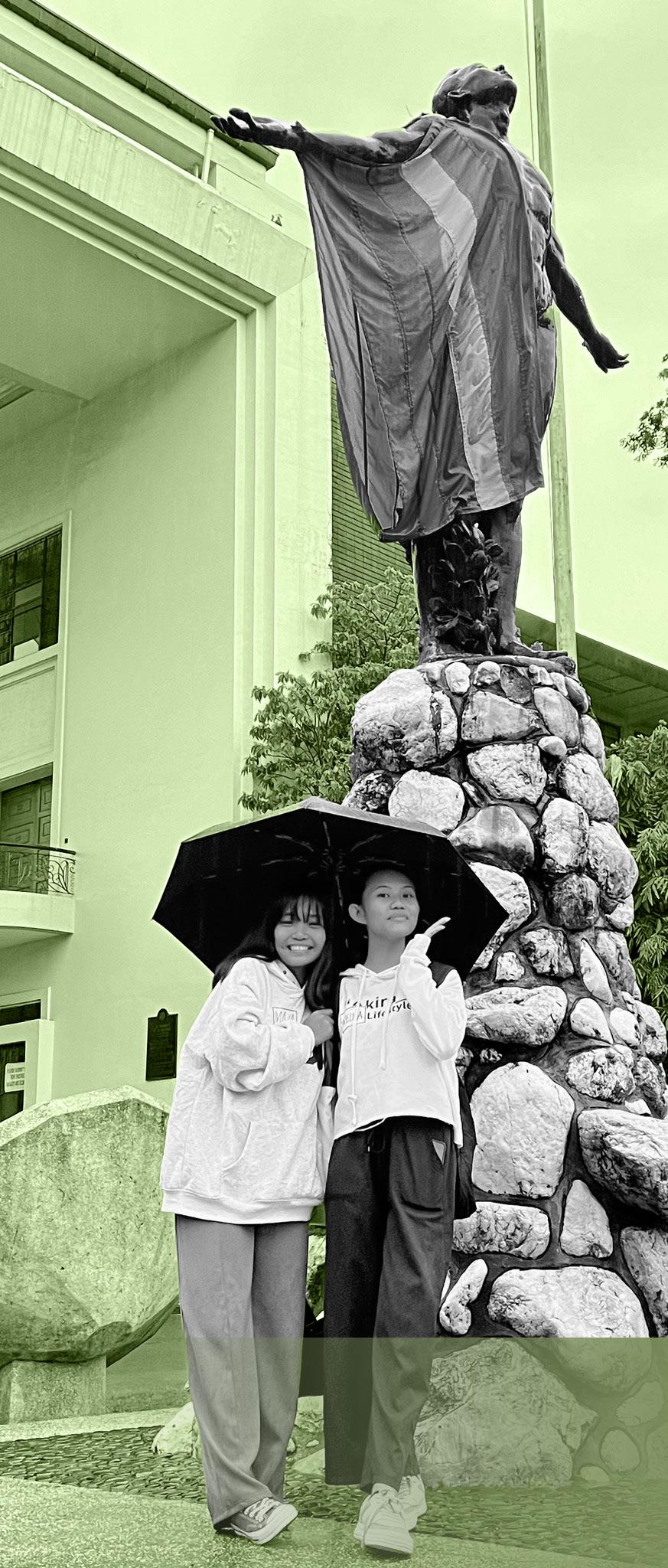
WHILE THERE ARE AT LEAST 30 MECHANISMS FOR PEOPLE’S PARTICIPATION IN DEPED’S EDUCATION GOVERNANCE BASED ON POLICIES, MOST OF THEM ARE TRUE ONLY ON PAPER.
AS ADVOCATED BY EDCOM II IN THE 2024 AND 2025 DOH AND DSWD BUDGET DELIBERATIONS, AGENCIES SHOULD ENHANCE NUTRITION COUNSELING FOR PARENTS AND CAREGIVERS ON PROPER INFANT FEEDING PRACTICES.
EARLY CHILDHOOD EDUCATION BEGINS AT HOME. RESEARCH HAS CONSISTENTLY SHOWN THAT THE PRESENCE OF BOOKS IN THE HOME ENVIRONMENT SIGNIFICANTLY IMPACTS A CHILD’S EDUCATIONAL TRAJECTORY.
ORIENTING LEARNERS ABOUT REPORTING PROCEDURES IS CRUCIAL, ENSURING THEY KNOW WHO TO APPROACH AND HOW TO REPORT INCIDENTS.
COLLEGE PREPS

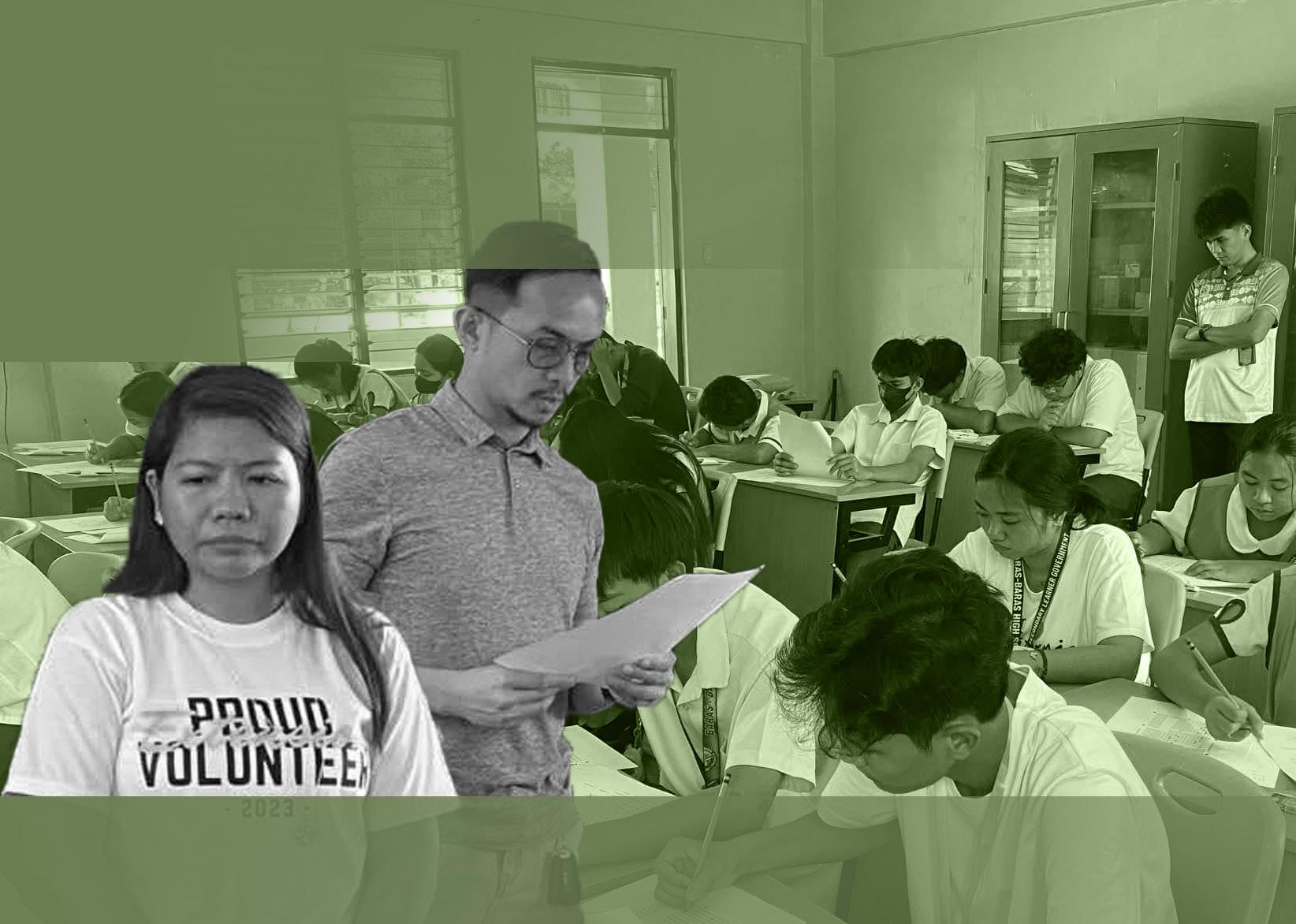
The Sangguniang Kabataan of Brgy. BarasBaras in Tarlac City supported the preparations for upcoming college entrance exams of Grade 12 students from Baras-Baras High School.
On January 27, the Sangguniang Kabataan collaborated with Tarlac State Uni-
versity to successfully launch the first day of Project Sk-Ace, which stands for Academic Coaching for Excellence in College Admissions.
Project SK-
Ace aims to assist students, particularly those preparing for college, in their college applications and exam
preparations. Under the leadership of Hon. Kate Tabamo Tagara, and with the help of speakers Professor Laarni T. Capinding from the College of Education and Engr. Emir Lenard S.F. Sicangco, Director of the Office of University Extension Services, the preparation sessions proved effective for the students.
This initiative is being implemented with the support of Tarlac State University and the Baras-Baras Senior High School Department. The program will continue until February 7, featuring two sessions each week.
JOURNEY TO PHENOMENON
School heads, teachers engage in quali studies

QUYNH JOSEPHINE A. ESTRELLA
TARLAC City Schools Division mobilized a qualitative research campaign through Divison Memorandum 289, s. 2024. School heads and their respective Practical Research 1 teachers participated in the training and workshop in writing qualitative research.
Then school
head, Dr. Mamerto L. Ragel, Jr. along with Sir Jon Henry B. Ordonez wrote and presented their research proposals on the topics of teacher assessment and artificial intelligence in language assessment respectively.
The participants are scheduled to present the results of their data-gathering on February 2025.
SHS ups ICT skills; attend Adobe tutorials

TIFANIE A. BAGSIC
The Senior High School Department partnered with Tarlac State University College of Computer Studies in upskilling the students in ICT.
The learners were given a tour on the navigation of Adobe Creative Cloud applications -- Photoshop and Premiere Pro on December 2, 2024
The program is also a teaser for the upcoming ICT program to be offered by the senior high school department next year.
Teachers attend R3 confluences

MAJA S. MARTINEZ
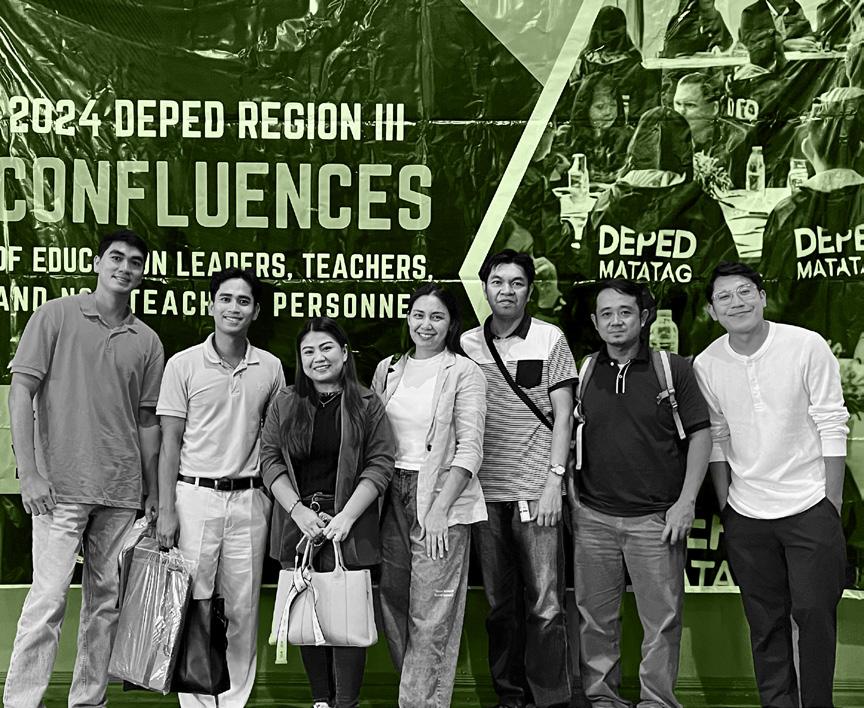

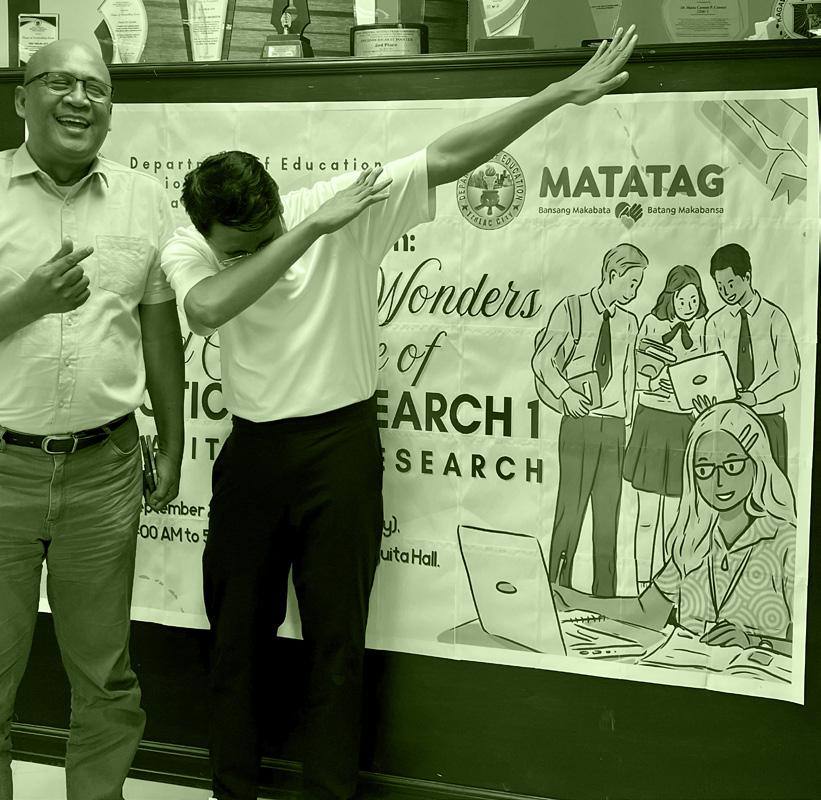
Baras - Baras High School goes to University of the Assumption, San Fernando, Pampanga for the Region 3 Confluence of Teachers on November 13, 2024.
Teachers, Gerald Bulusan, Mary Joyce Camille Paras, Ivy Marcelo, Wilson Dela Cruz, Francis Garcia, and Jon Henry Ordonez attend discussions on the topics of elevating
A NATION TO RAISE A CHILD

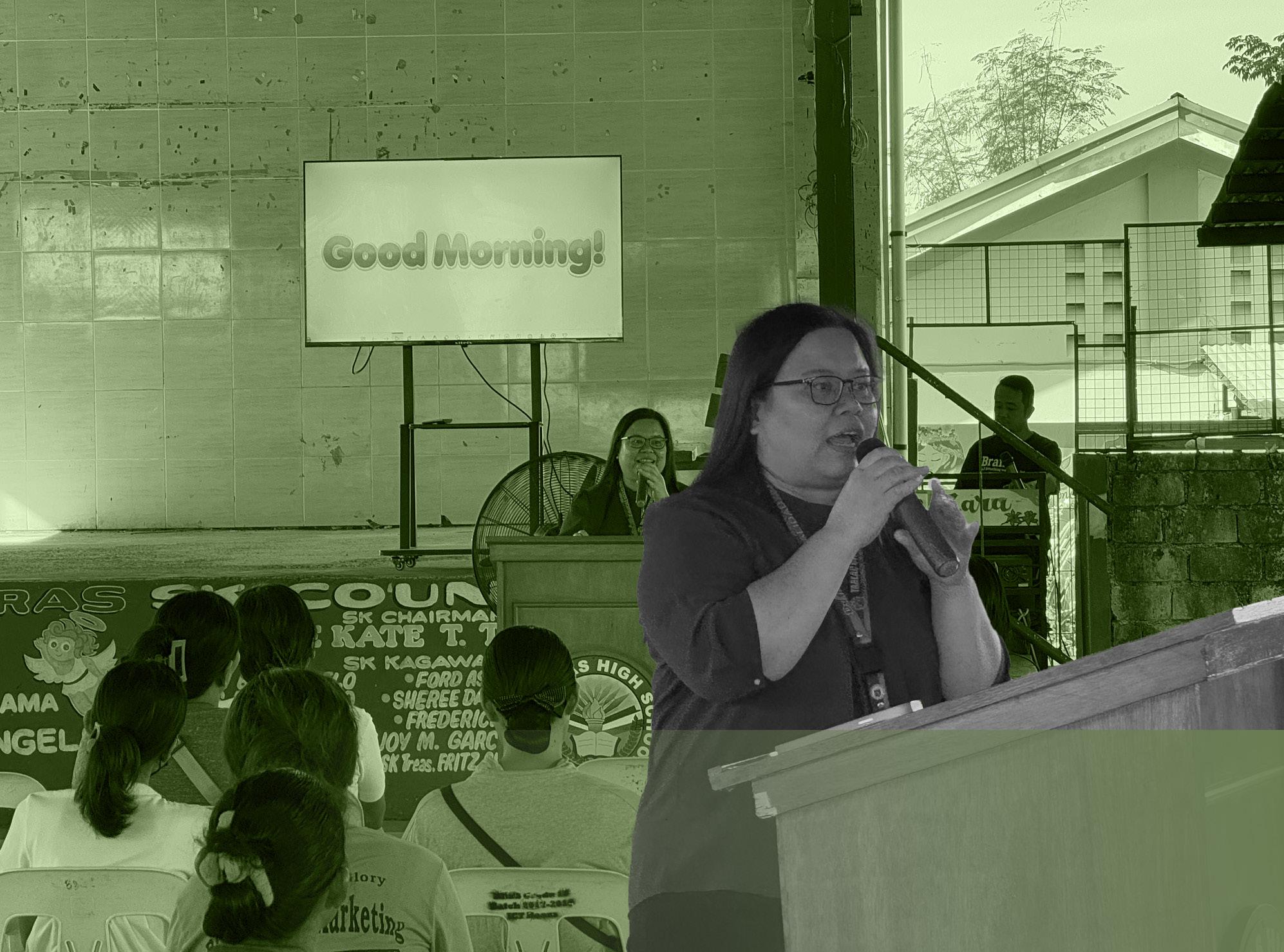
The School Parent-Teacher Association (SPTA) of BarasBaras High School held a General Meeting at the Baras-Baras Covered Court on January 24, 2025.
The meeting aimed to provide
on the significance of collaboration among parents, teachers, and
other stakeholders to create an environment conducive to student development. She emphasized that “It takes a village to raise a child,” highlighting the crucial role each individual plays in the academic growth of youth, both within the school and throughout the community.
The meeting also covered planned activities for the National Learning Camp 2025, early registration for the 2025-2026 school year, projects for Senior High School, and a review of school policies and regulations. Updates on the school’s status and initiatives aimed at enhancing education-
al quality for students were also discussed.
This gathering served as an opportunity to strengthen relationships among teachers, parents, leaders, and the entire community to reinforce their roles in shaping young learners.
practices in classroom teaching, artificial intelligence integration to the teaching and learning process and a stress-management discussion.
The confluence aims to These programs are designed to foster collaboration among educators and equip them with innovative tools to improve student learning outcomes.
BY
THE NUMBERS
Baras - Baras High School took to Microsoft Forms to answer a survey on their perceive programs to be given focus by the school.
Of 252 respondents, the TOP 3 programs to be prioritized should be:
2
3
JOHN AARON P. RIGOR
BEYOND BARAS
04 HEADLINES
BUDGET CUTS
Angara, teachers decry 12-B cut in DepEd funds

LOWELLA J. BASAS
EDUCATION Secretary Sonny Angara and teachers’ groups showed disappointment in the Congress’ decision to slash P12 billion from the DepEd’s 2025 budget.
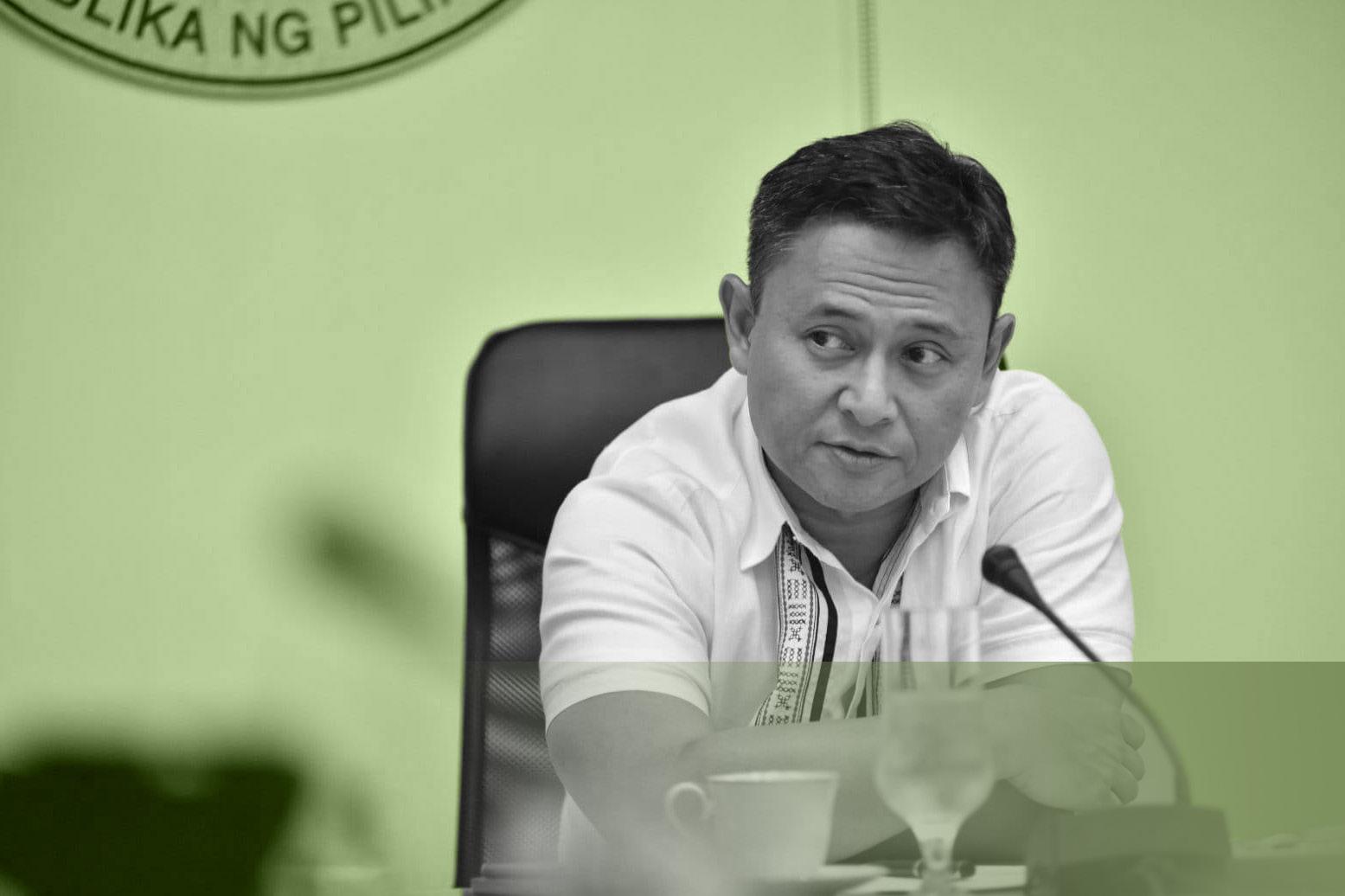
Angara shows his sentiments via X platform over the budget decision.
“Sad to learn that both houses of Congress have decided to decrease by P12 billion the budget the President proposed for DepEd for 2025. This reverses a trend in recent years where Congress added even more to the education budget,
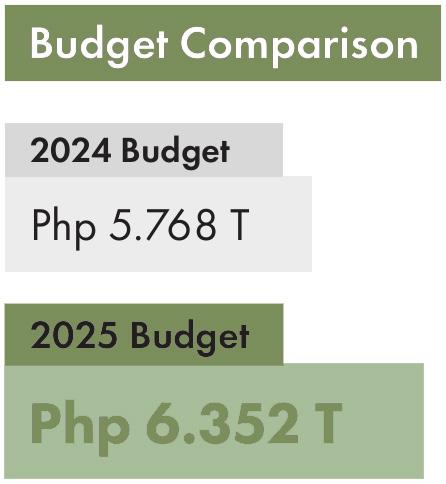
save for one year during the pandemic,” Angara posted on December 12.
Meanwhile, The Teachers’ Dignity Coalition said the budget cut will widen the digital divide among students and worsen the learning crisis following the COVID-19 pandemic.
Of the amount cut, P10 billion will be slashed from the
Infrastructure is important, but so is investing in our people and human capital. The digital divide will widen,”
DepEd’s computerization program, which aims to provide public schools with gadgets, equipment, software and training for teachers and students.
“Those who do not have computers will find it hard to catch up,” Angara said on a visit to public schools in Iloilo City.
The bicameral
conference committee reduced DepEd’s 2025 funding allocation to P737 billion, from P748.65 billion, in the reconciled version of the General Appropriations Bill (GAB).
The DepEd will explore partnerships with the private sector and non-government organizations to provide technology to public schools, Angara said.

JADY S. ANDRIADE
Baras - Baras High School through the efforts of Sir Francis G. Garcia and Sir Wilson S. Dela Cruze utilize its ICT resources to make the post-test implementation for the Programme for International Student Assessment (PISA) under Science easier for students.
BBHSians logged in their respective accounts via the Department of Education Learning Management System (DepEd LMS) last December 13 and 16, 2024.
DEJA VU?
Secretary Grace Poe pointed out that despite the budget cut, the DepEd’s 2025 budget increased from this year’s P715.3 billion.
The utilization rate of the computerization program is at 50 percent in 2023 and 11.92 percent as of June 2024, Poe said, citing the Commission on Audit report.

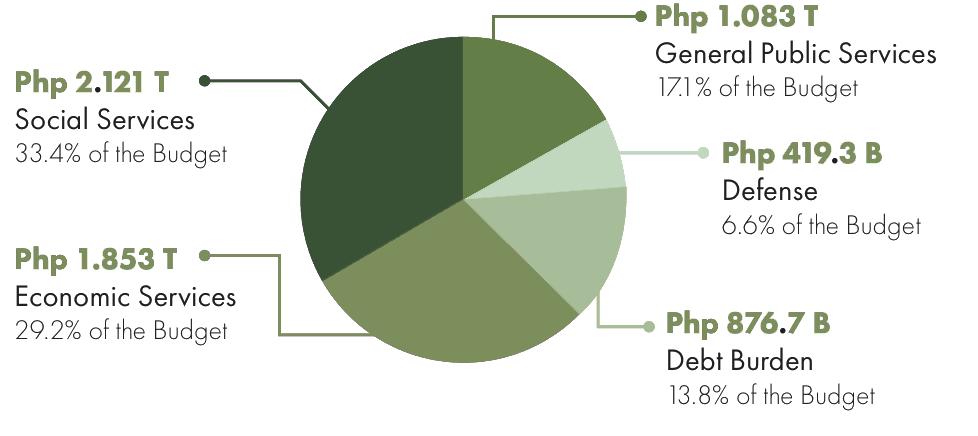
LEADERS’ SUMMIT
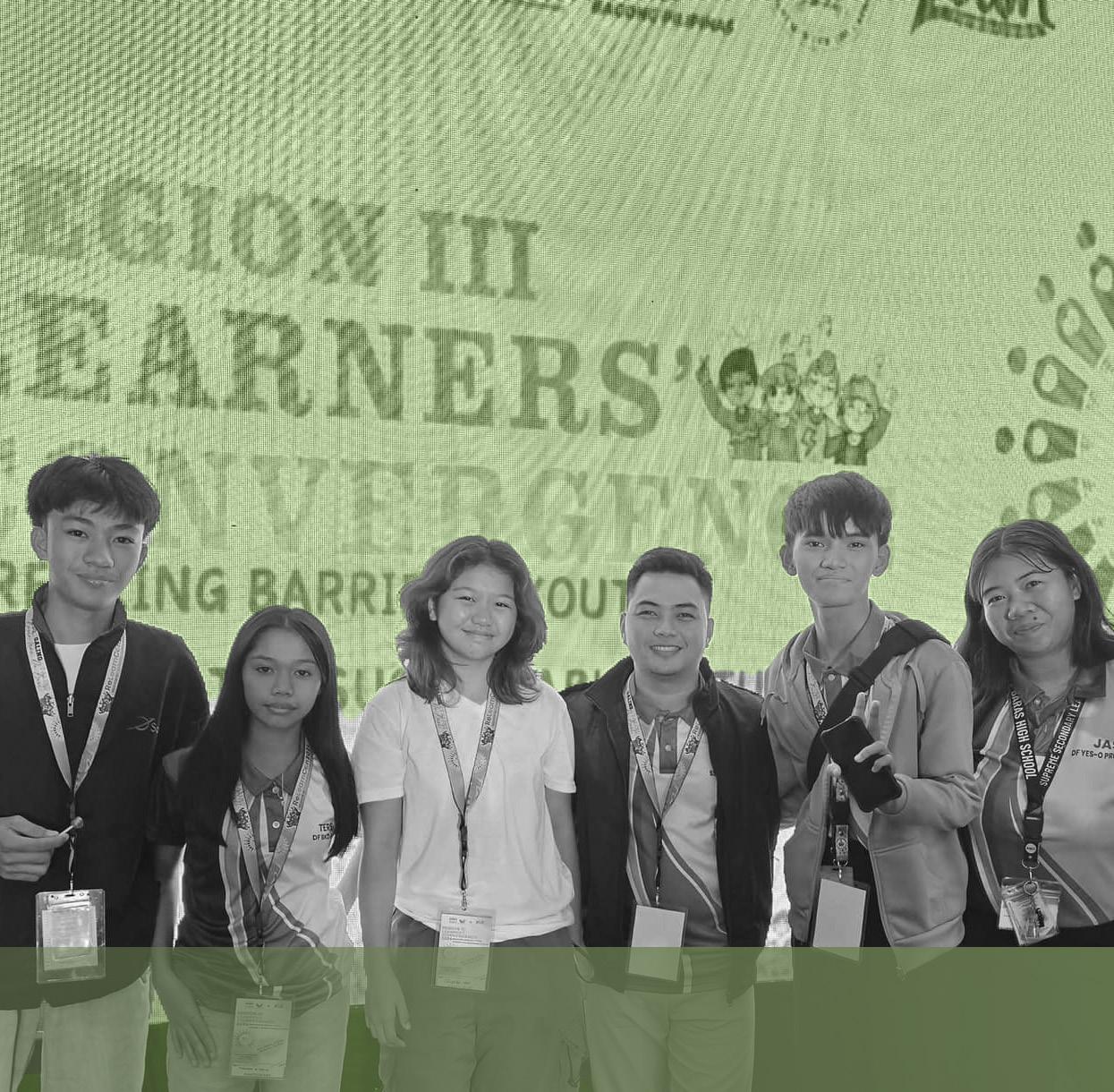
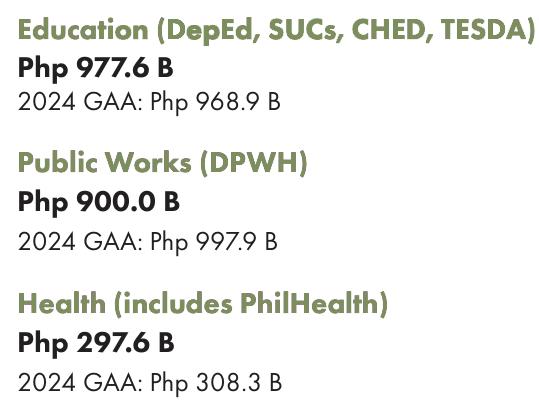
OVERSEAS

JANELLA MAE M. FURIO
Student leaders of Baras - Baras High School went to Lubao, Pampanga to attend the Regional Learners’ Convergence from January 23 - 24.
With the theme,
BY THE NUMBERS

“Breaking Barriers: Youth Leading the Sustainable Future”, the activity aims to gather student leaders from Region 3 to discuss and make plans in inspiring change and innovation in their respective schools.
Among the topics discussed were on creating impactful project proposals.
Ms. Jasmine Camile Ibanez of Grade 12 Pacioli also geve a talk on her experience as student leader.
TWO GENDERS
Trump makes gender restriction official; scraps DEI policies

JOHN AARON P. RIGOR

US President Donald Trump signed executive orders on January 20, 2025, declaring that the U.S. government will recognize only two sexes—male and female— while revoking several Biden-era directives aimed at promoting gender diversity and inclusion.
The orders aim to eliminate federal funding for diversity, equity, and inclusion (DEI) programs and restrict gender-affirming care for minors.
This move aligns with Trump’s campaign promises to counter what he termed “radical gender ideology” and has sparked significant backlash from DEI advocates.
Critics argue these measures could marginalize LGBTQ+ individuals further, while supporters claim they restore traditional values. The orders have drawn sharp debate over their social and legal implications.
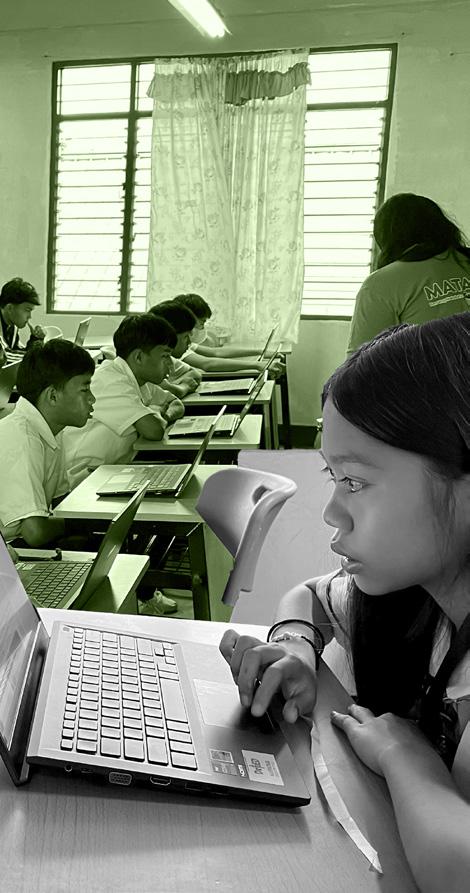
BBHS shift to modules amid suspensions

QUYNH JOSEPHINE A. ESTRELLA
As the school year is bombarded by multiple class suspensions due to inclement weather conditions, Baras - Baras High School opted to shift to maximize the use of its Alternative Delivery Mode (ADM) modules.
To facilitate monitoring, student were asked to submit documentation of their engagement with the modules which shall be submitted to their teachers the next class day.
While it addresses the problem with lost time due to the class suspensions, the proposed solution sits unfavorably to the students.
“Parang COVID-19 lang ulit. Sabay-sabay sila nagsesend ng utos sa group chat tapos agadagad pinapapasa,” one student aired her sentiments.
‘‘Parang COVID-19 lang ulit. Sabaysabay sila nagsesend ng utos sa group chat tapos agad-agad pinapapasa.
“Dapat magkaroon sila ng bagong paraan para matuto pa rin kami kahit maraming suspension nang hindi kami pagod parehas.” A student added.
The Department of Education released a revised guideline via DepEd Order No. 22, s. 2024 where it indicated that students from junior high school shall only have their class suspended under tropical cyclone wind signal (TWCS) 2. Meanwhile, senior high school students as well as those in tertiary education shall only have their class suspended under TWCS 3.
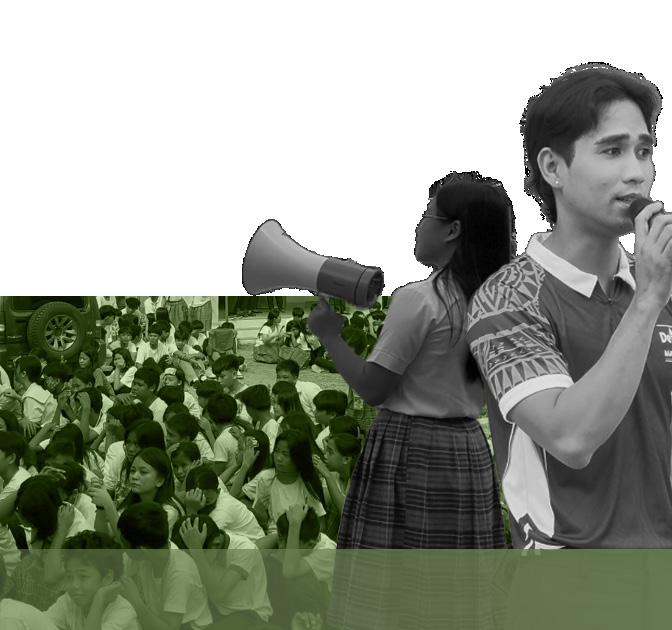
Baras-Baras High School conducted an earthquake drill, in compliance with the Nationwide Simultaneous Earthquake Drill.
Led by SDRRM Focal Person Sir Gerald D. Bulusan, students and teachers participated actively in the exercise held at the Junior High School Quadrangle.
During the drill, students were instructed to “duck, cover, and hold” to practice safety measures during an
This initiative aligns with the
al Disaster Risk Reduction and Management Council (NDRRMC) memorandum No. 86, 2023, and Regional Risk
and Management Council (RDRRMC) memorandum No.
DEPED SEC. SONNY ANGARA
BEYOND BARAS
the sentinel editorial board 2024 - 2025
J.
P. RIGOR

M.
B.

COLLAPSE OF THE MARCOS-DUTERTE UNITY
The dissolution of the Uniteam alliance between President Ferdinand Marcos Jr. and Vice President Sara Duterte has sent shockwaves through Philippine politics, exposing deep divisions that threaten national stability. What began as a campaign built on unity has unraveled into a bitter feud. As both leaders navigate their separate paths, the impact on the Filipino people becomes more apparent, affecting governance, public trust, and economic and social stability.
FROM ALLIES TO ENEMIES
The 2022 elections saw the rise of the Marcos-Duterte tandem under the banner of unity, securing a landslide victory on the promise of national cohesion. However, their relationship deteriorated in 2024, culminating in a bitter political standoff. The rift became undeniable as their differences turned into open conflicts. Investigations into Duterte’s use of confidential funds, Marcos’ rejection of the previous administration’s bloody drug war, and impeachment complaints against Duterte fueled tensions further. The situation escalated when she was investigated for allegedly making death threats against the president. These clashes reveal deeper power struggles that could have serious consequences for governance and public welfare.
PUBLIC TRUST ON THE LINE
One of the immediate effects of this feud is its impact on public trust. The latest Pulse Asia survey reveals a decline in Duterte’s approval and trust ratings, particularly in Mindanao and Visayas— regions that were once her strongholds. The
perception that she misused government funds for political ambitions has likely contributed to this decline. Meanwhile, Marcos’ administration is facing its own challenges, including budget delays and economic concerns. The ongoing political bickering only worsens the situation, diverting attention from national issues.
A BATTLE FOR POWER
The feud also reshapes the political landscape ahead of the 2025 midterm elections. With Duterte facing impeachment complaints and criminal investigations, her political future hangs in the balance. Lawmakers might delay impeachment proceedings until after the elections, leaving the issue hanging over candidates’ campaigns. The power struggle within Congress, particularly between Marcos’ allies and Duterte’s supporters, will significantly influence the election results. Voters are left navigating a divided political arena with shifting alliances and no clear leadership to unify the nation.
A NATION CAUGHT IN THE CROSSFIRE
The ongoing feud between Marcos and Duterte is taking a toll on the Philippines, affecting not just its economy but also its social stability. Government work is disrupted, leaders are divided, and pressing issues like inflation, unemployment, and social inequality are being overshadowed.
Journalist Manny Mogato warned that investors might lose trust in the country due to Duterte’s alleged threat to kill Marcos, raising doubts about political stability. The social implications are just as alarming, as the feud divides the Filipino people, erodes trust in leadership, and
When I reflect on my journey as a student, I never imagined I’d become someone others could look up to. I used to think leadership was reserved for those who showed confidence and always had the answers.
I was far from that.
Like many of you, I doubted myself and wondered if I could ever step up when it mattered. But I’ve learned that growth often comes when we least expect it—through moments of uncertainty, small victories, and, most importantly, through the people who believe in us when we struggle to believe in ourselves.

A NATION IN CRISIS
weakens national unity. Instead of addressing urgent concerns like aid for typhoon victims, political drama is taking center stage. The country needs a unified government to focus on real solutions.
A TALE OF TWO SPEECHES
Despite the chaos, 2025 presents an opportunity for both leaders to recalibrate their approaches. In his New Year’s message, Marcos emphasized resilience and recovery, particularly in light of recent calamities, steering clear of political turmoil. Duterte, however, invoked her previous calls for unity, signaling her intent to maintain political influence despite mounting legal challenges. Their contrasting messages only highlight the deep divisions at the highest levels of government, sending mixed signals to the public about leadership and priorities. If the nation’s top leaders cannot unite, how can they expect ordinary citizens to trust in governance?
A CYCLE OF BETRAYAL
The fallout is the latest proof that Philippine politics is built on shaky alliances. Their so-called unity was never about a shared vision—it was a temporary deal for power. Now, their war exposes the ugly truth that personal ambition always comes before national progress. This cycle of betrayal and shifting loyalties is keeping the country stuck in the same old system of power plays over progress.
NO MORE POWER PLAYS
As the 2025 elections approach, Filipinos must critically assess the impact of this political feud. This is no longer just a dispute be-
tween two leaders—it is a reflection of how politics is conducted in the country. Voters should demand accountability from both camps and push for leaders who prioritize governance over personal rivalries. Political stability cannot be achieved when national leaders focus more on undermining each other than on addressing the country’s urgent needs.
BREAKING FREE
This feud is a symptom of a larger issue—the failure of Philippine politics to rise above personal ambition and genuinely work for the people’s welfare. The challenge for Filipino people is to break free from personality-driven politics and support leaders who offer real solutions instead of empty theatrics. As the country faces the challenges of 2025, leaders must set aside personal grievances in favor of collective progress. Only through genuine unity and accountable leadership can the nation move forward toward lasting stability and development.
‘‘ Political stability cannot be achieved when national leaders focus more on undermining each other than on addressing the country’s urgent needs.

have to face it alone. When you feel stuck or afraid, remember my words: “Kaya mo ‘yan, naniniwala ako sa kakayahan mo.” Believe in your potential, because I do.
To The Sentinel, my family, and my team, I offer my heartfelt gratitude. Thank you for always supporting me, understanding me, and trusting my leadership even in uncertain times. You make me feel like the best leader you’ve ever had, and that means the world to me. When I assign you tasks, it’s not to burden you but because I see your talents and want you to grow. Watching you improve fills me with pride and joy.

“ Step up, step in,
and surprise yourself.
I’ve had my share of struggles. There were times I felt like giving up, especially when things didn’t go as planned. I compared myself to others, convinced that I wasn’t enough. But through those tough moments, I discovered the importance of persistence, and the strength found in the support around me. Leadership isn’t about having all the answers— it’s about being willing to learn and grow along the way.
To the BBHS student body, I want to remind you of this: every challenge is an opportunity. You don’t have to be perfect, and you don’t
To all BBHSians, I encourage you to step out of your comfort zones. Consider joining The Sentinel, where you can hone your skills, build confidence, and unlock new opportunities. You’ll gain more than just experience— you’ll discover your potential.
We are all in this journey together. Let’s not just aim to survive our challenges— let’s thrive, uplift one another, and create something meaningful. Be part of the change, step into your potential, and let’s make a difference, one step at a time.
adviser’s note
Your ideas are not your identity.
In journalism and in life, holding onto rigid beliefs limits your ability to see the bigger picture. The world is complex, and so are the stories we tell. A truly open mind isn’t afraid to confront new perspectives or challenge assumptions. It’s not about being right all the time—it’s about being brave enough to say, “I’ve learned something new.”
As forefronts of critical thinking, your job isn’t just to inform—it’s to explore. To do that well, you must be willing to let go of certainty and embrace curiosity. Dive into topics with a hunger for understanding. Seek out viewpoints that oppose your own. Ask hard questions, even of yourself. Growth happens when you’re willing to admit that what you thought yesterday might not hold up today.
Mind you -- this isn’t about abandoning your values; it’s about refining them. Changing your mind doesn’t mean losing who you are—it means becoming someone wiser and more thoughtful. It’s a sign of courage and maturity to evolve in the face of new knowledge.
So as you take on this year’s stories and assignments, I urge you to write boldly but think flexibly. Don’t fear being wrong; fear staying stagnant. Let curiosity guide you, and let growth define you. The best writers—and people—are those who never stop learning. Be one of them.

“
Do not define yourself by your opinions. Integrity -- too, is loyalty to growth,
LOWELLA J. BASAS Editor-in-Chief
JON HENRY B. ORDONEZ School Paper Adviser

LEANING TOWER OF PISA
EDCOM II:
However, another issue is the absence of parents, as 40% migrate for work, leaving childcare to siblings, grandparents, or house helpers. These challenges highlight the urgent need for more investment and awareness to give every child a strong start in education.
A LESSON LOST IN TRANSLATION
Good education depends on great teachers, but the current system fails to properly equip them. Despite efforts by the Teacher Education Council (TEC) to improve training, there is still a mismatch between teacher preparation and real classroom needs.
A major issue is that many teachers are assigned subjects outside their expertise. Research shows that 62% of high school teachers teach subjects they didn’t specialize in, with STEM (Science, Technology, Engineering, and Mathematics) being the most affected. Shockingly, 98% of physical science teachers and 80% of biological science teachers lack proper training in their fields. This weakens the quality of instruction and limits students’ learning.
Beyond subject mismatch, another issue is the gap between teacher training and classroom realities.
While teachers undergo training, much of what they learn is not applied in actual teaching. This disconnection leads to poor student performance
and low engagement. Without fixing these gaps, education quality will continue to suffer. Teacher training must not only be improved but also made relevant to real classroom settings.
NO PROGRESS, JUST PROBLEMS
The education system is stuck in a cycle of mismanagement, lack of funding, and wasted resources. These problems have kept learning outcomes stagnant since the 1990s. The system is divided among three agencies—DepEd, CHED, and TESDA creating confusion and inefficiency in decision-making. With no clear coordination, policies are developed separately, leading to scattered and ineffective planning. Another problem is the unclear role of private schools. Private school enrollment has dropped by 20%, putting more pressure on public schools, which are already struggling.
Meanwhile, the focus on learning outcomes remains weak, with only 8 out of 88 targets in the Basic Education Development Plan centered on actual student performance. Budget allocation is also falling behind global standards, with basic education getting the smallest share of government funds. Schools are left with little money for maintenance and other needs, forcing them to depend on outside help. These governance and financial issues, along with problems in teacher training and curriculum gaps, prove the urgent need for serious and committed education reforms.
EDUCATION DEMANDS ACTION
The future of Filipino students is on the line, and action is needed now. The government must increase education funding, making sure every child, no matter their background, gets quality learning.
Teachers must
receive proper training that matches what they actually teach. Parents must understand the importance of early childhood education.
Schools need more support, and leadership in education must be unified and efficient.
Change does not happen overnight, but it starts with a choice—the choice to invest in education, to demand better policies, and to take real action.
If reforms are ignored, the

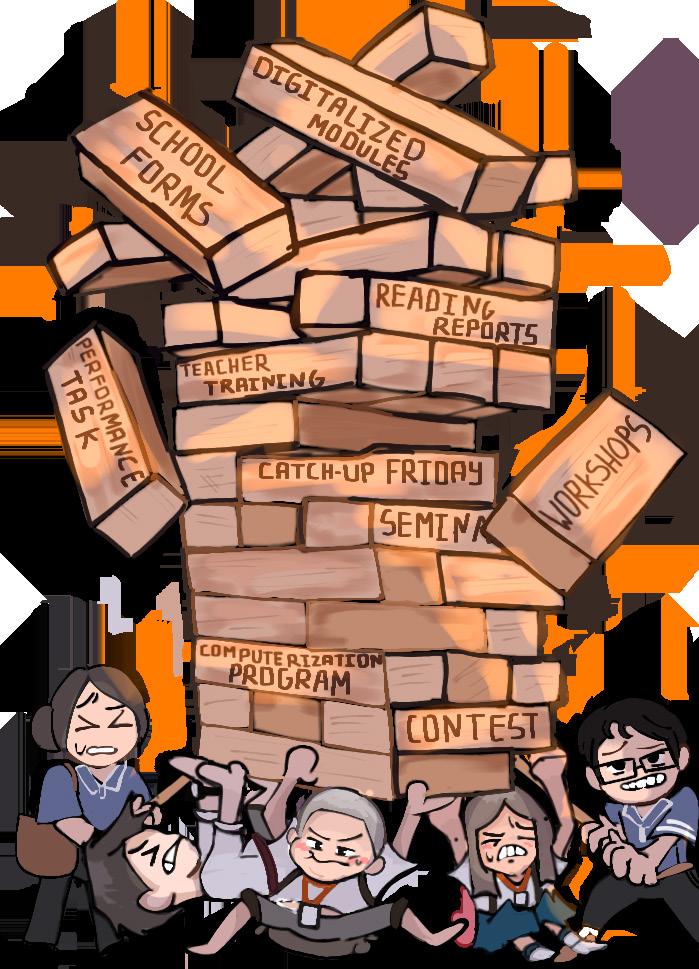



Catch-Up or Another Cover-Up?
As someone who has experienced the evolution of our education system firsthand, I cannot help but view this program with concern. The rushed nature of its implementation raises concerns about its effectiveness and the burden it places on already overworked teachers. Ordered on a Wednesday and implemented just two days later, without prior consultation with teachers or thorough preparation, it seems more like a reactive move to save face in the wake of the damning 2022 Programme for International Student Assessment (PISA) results than a well-thought-out educational reform.
they cannot even decode.
by LOWELLA BASAS
The Department of Education’s (DepEd) latest initiative, “Catch-Up Fridays,” sounds promising on paper—dedicating one day a week to reading, values, peace, and health education. However, like many well-intended yet rushed implemented programs, it risks being another band-aid solution rather than a genuine step forward in addressing the country’s worsening education crisis. that feels organic and engaging, rather than treating it as an isolated intervention.
Moreover, the lack of proper planning reveals a fundamental flaw in DepEd’s approach to education reform: it prioritizes appearances over actual impact. Instead of addressing systemic problems such as poor literacy rates, inadequate teaching resources, and oversized classrooms, it places a superficial fix over a deep wound. If this program were genuinely meant to address reading deficiencies, rushing its implementation wouldn’t make sense. A proper needs assessment should have been conducted first.
One of the most glaring issues with “Catch-Up Fridays” is its lack of preparation and clear direction.
The directive to “Drop Everything and Read” (DEAR) may sound like a fun, engaging initiative, but how effective can it be when there was barely any time to train teachers or design a structured approach? Reading interventions should be tailored to different levels of literacy, yet this program lumps all students together without considering their unique struggles. A struggling reader cannot benefit from an assigned text

Anyone who has been inside a public school classroom knows that learning conditions are far from ideal. With classes often exceeding 50 students per room, how can a teacher effectively monitor individual reading progress? “Catch-Up Fridays” does not address the fact that students require differentiated instruction based on their reading levels. While some may be ready for comprehension exercises, others are still struggling with decoding skills. Infrastructure problems also persist. Many schools lack functional libraries, and even if
ELLYSIANSCRIBBLING
they have one, book selections are often outdated. How can students develop a love for reading if they are not provided with engaging, age-appropriate, and relevant materials? If DepEd is serious about improving literacy, it should start by investing in school libraries, hiring more reading specialists, and reducing class sizes.
Beyond infrastructure and instructional issues, DepEd’s program fails to acknowledge that reading problems are also rooted in socioeconomic realities. A hungry student will not be able to concentrate on reading, no matter how engaging the activity is. A child who works after school to help support their family may not have the luxury of practicing literacy skills at home. Simply designating one day a week for reading does nothing to address these deeper issues. Motivation plays a crucial role in literacy development. If a student sees reading as a chore rather than an enjoyable activity, then no amount of forced reading sessions will make them better readers. We must create a culture of reading, not just a scheduled time for it. This means integrating reading into daily activities in a way
The Urgent Need for Comprehensive Sex Education by TIFANIE
BAGSIC
The statistics are shocking: live births among girls aged 10 to 14 in the Philippines surged from 2,411 in 2019 to 3,343 in 2023—a staggering 6.6% increase. These numbers represent not just data points but stolen childhoods and futures derailed by a crisis that ripples through families and society. Every day, over 500 adolescents become mothers, some as young as ten years old. This is not merely a health issue; it’s a moral emergency.
At the heart of this crisis lies a glaring lack of comprehensive sexual education (CSE). Without proper guidance, adolescents navigate complex issues about their bodies and relationships, leading to poor decisions with lifelong consequences.
The proposed Adolescent Pregnancy Prevention Bill aims to integrate CSE into school curricula nationwide, equipping young people with essential knowledge about anatomy, consent, safe sex practices, and emotional relationships.
The potential impact of CSE is profound. Educated youth are more likely to delay parenthood and pursue higher education, breaking free from cycles of poverty. However, education alone isn’t enough; families must engage in open discussions about sexual health to reinforce lessons learned in school and dismantle stigma.
Ignoring this issue has immense societal costs. Adolescent
To be fair, “Catch-Up Fridays” is not entirely without merit. Some may argue that dedicating a day to reading is at least a step in the right direction, especially in a system where literacy levels have plummeted. The idea of promoting a non-graded, pressure-free reading day could foster a more relaxed learning environment, making reading feel less like an academic requirement and more like an enjoyable pastime. Additionally, the encouragement of creative activities and teacher collaboration could inspire innovative approaches to literacy development.
However, even with these potential benefits, a program that is poorly executed is unlikely to yield meaningful results. If DepEd truly believes in this initiative, then it must back it up with the necessary resources, training, and infrastructure improvements. Otherwise, it risks becoming just another performative policy—a temporary fix that fails to address the root of the problem.
If DepEd genuinely wants to improve
literacy rates, it should focus on long-term strategies rather than rushed, short-term solutions. First, there should be a nationwide literacy assessment to determine where students actually stand, rather than assuming their reading levels based on their grade. Second, proper teacher training should be prioritized, ensuring that educators have the skills and knowledge to implement effective reading interventions. Third, investments should be made in improving school libraries and providing students with engaging and relatable reading materials. Lastly, socioeconomic factors that hinder students’ ability to focus on learning should be addressed—because no amount of reading programs will help a child who comes to school hungry, exhausted, or unmotivated.
In its current form, “Catch-Up Fridays” appears to be more of a cover-up than a catch-up. It is a knee-jerk reaction designed to create the illusion of progress rather than a wellthought-out solution to the nation’s literacy crisis. While the intent behind the program may be commendable, good intentions alone are not enough.
If DepEd truly wants

“
The directive to “Drop Everything and Read” may sound like a fun, engaging initiative, but how effective can it be when there was barely any time to train teachers or design a structured approach?
to make a difference, it must take the time to craft policies that are research-based, well-planned, and sustainable in the long run. Otherwise, we will find ourselves revisiting the same issues year after year, applying new band-aids to an ever-growing wound.
Education reform should not be about what looks good in a memo or press release—it should be about what actually works. If we keep applying policies that are careless and reactive, we are not really catching up. We are just covering up the cracks, waiting for them to break open again.
pregnancies trap young girls in poverty and discrimination, forcing many to abandon their education and assume heavy responsibilities. Fear of stigma often drives these girls into hiding, cutting them off from vital health services.
Critics may argue that CSE challenges cultural norms, but the reality is that teenage pregnancy already exposes young girls to exploitation. Passing this bill is essential—not only to educate and empower our youth but also to protect them from harm.
The time for action is now. Stakeholders—government officials, educators, parents—must unite to ensure every Filipino adolescent has access to the sexual education they need and deserve.
The Adolescent Pregnancy Prevention Bill represents hope for a future where children remain children and can dream big without the weight of premature responsibilities. Let’s stop applying bandaid solutions to deep
wounds; let’s give our children the chance at a better life they truly deserve.
education alone isn’t enough; families must engage in open discussions about sexual health to reinforce lessons learned in school and dismantle stigma.





Recently, the House of Representatives passed the second reading of House Bill 11213, which gives Grade 10 students like me the option to skip senior high school (SHS) and go straight to college or technical-vocational programs—if we pass an Honors Exam. This bill has started a big debate, with some people in favor of it and others worried about its effects.
As a student, I see why many of my classmates and their parents support this change. Education is expensive, and adding two more years just makes it harder for families to afford. Survey in 2022 stated that 44% of Filipinos were unhappy with the K-12 program, mostly because of the extra costs. If some of us are already prepared for college, why should be staying in SHS be mandatory?
Before K-12 was implemented, stu-
Skipping SHS; Head start or a setback?
by MAXENE JEWEL ABELLA
dents went to college for just four years of high school, and yet, many still did well in their life tracks and careers.
Even the Commission on Higher Education (CHED) says that universities already teach general education similar to what SHS gives us, so some lessons might just be repetitive. If I can pass an honors exam, why should I be forced to stay in SHS? For students like me who are ready, skipping SHS could be a great opportunity to save money, time and to achieve our life goals sooner.
Another reason why people like this bill is that SHS does not always guarantee a job. A study in 2020, found that only two in ten SHS graduates were able to find work. If SHS was designed to help students be ‘ job-ready’ , why aren’t more of them getting hired?
Maybe some students do not actually need those two extra years and should be allowed to move forward sooner.
House Bill 11213 gives us more choices, which I think is a good thing. But before we make SHS optional, we need to make sure that students are truly ready for college . Instead of skipping SHS, maybe we should focus on improving the education system so that all students, have a fair chance at success.
If I can pass an honors exam, why should I be forced to stay in SHS?
MAXPEN
08 PERSPECTIVES

CHICHAARON
In the Gov, We all Fam
by JOHN AARON RIGOR
With my entire years of existence, I’ve encountered many different names in the field of politics. And when I tell you, I’m tired of seeing the same old faces and surnames, and their recycled lines of promises that they put in their campaign posters -it’s an eyesore.
Much worse if during the election season, I see these enormous tarpaulins pinned into a wall or hanging on a pole.
What I see from there is not a partylist, all I can see is a family picture that disguises themselves as politicians. Just what exactly were they thinking? What comes to their mind when they decide that they want to include themselves in a picture filled with politicians? Why are they so obsessed with the idea of having each member of their family to have a title of their own?
“
And when I tell you, I’m tired of seeing the same old faces and surnames, and their recycled lines of promises that they put in their campaign posters -- it’s an eyesore.
Maybe they want their children to continue the family legacy of being a politician, even if it’s obviously too early for them and they’re not yet ready for the things that they have to handle.
Or, be the living proof that they are much better than their rivals from the other party who wants
BY THE NUMBERS
to continue their rivalry.
And at last, the possibility that they’re just afraid to be powerless.
Yup, the fear of seeing others rise on top, as they succumb to the ground alongside with their name and be forgotten. In any case, this just shows no regard for the people under their governance, as they only think about preserving themselves and the power they acquire from the government.
A study of Dean Mendoza et al., finds that 75 percent of district representatives, 85 percent of governors, and 66.67 percent of mayors could be considered as dynastic; that political dynasties tend to dominate the major political parties; and that candidates from political dynasties register larger winning ratios compared to non-dynastic candidates.
It was also stated that Political Dynasties can create barriers to stop those who are truly the best and the brightest that could bring a more desirable future for the people. Mendoza concludes that the fatter the dynasty, the poorer the community.
Political Dynasties are something that must be discarded and discontinued. Not only does it abuse its power, it also abuses its people. Political Dynasties may bring outlaw, but you, as a smart citizen can bring them out of the law.
If politics doesn’t interest you, then it’s equivalent to saying that you have no interest in changing a world that suits you so well.
Vote wise, be the one to rise.
Baras - Baras High School took to Microsoft Forms to give their insights on political dynasties.
Of 252 respondents: 25%

This is why implementing a reward system is crucial—it transforms the classroom experience for hardworking students into one that celebrates achievement and fosters self-esteem.
Imagine a classroom where every effort is acknowledged. Awarding students for their hard work sends a clear message: their dedication matters. This mindset not only boosts morale but also encourages students to take pride in their accomplishments. After all, who wouldn’t feel more motivated knowing that their efforts could lead to recognition?
Let’s face it: investing time and energy into class projects, assignments, and performance tasks can feel futile when the only outcomes are letters or numbers. A well-structured reward system offers something tangible to strive for—a reason to engage deeply with
Power Up Progress

by QUYNH JOSEPHINE
Recognizing student efforts is a powerful catalyst for progress and positive behavior in the classroom. When students receive only negative feedback, it can be disheartening, sapping their motivation and enthusiasm.
the material. It creates an environment where students look forward to their contributions being recognized, fostering immediate dedication and commitment.
However, the challenge of motivating students extends beyond the classroom walls. Teachers, parents, and students themselves grapple with this issue daily. While a reward system won’t magically solve all motivational problems, it can significantly enhance engagement.
That said, we must tread carefully. Reward systems can have unintended consequences. Students may feel disheartened if they fail to meet expectations or miss out on rewards, leading to self-doubt. In some cases, the pressure to earn accolades can transform motivation into a burden, as students chase awards not for joy but out of

JANWRITES
Finding Balance in the Storm
by JAN ERIKA MACASAQUIT
The Philippines faced over 20 typhoons in just one year, disrupting countless lives and wreaking havoc on education. With classes frequently suspended, students were forced to adapt to learning from home. While this shift provided some relief from the chaos outside, it also brought immense academic pressure, turning the pursuit of high grades into a source of stress rather than achievement.
Both students and teachers are feeling the strain. The overwhelming load of performance tasks, quizzes, and activities leaves little room for focus or productivity. Teachers must rethink their approach—easing workloads instead of piling on assignments. A calmer classroom fosters better learning, and a more measured pace benefits everyone involved.
For students, unexpected breaks from school often mean turning to hobbies or video games for comfort. While these moments of relaxation—playing with friends, catching up on sleep—offer much-needed respite, they can also spark tension at home. Parents may perceive this downtime as laziness,
obligation.
For many students, receiving recognition may seem like a small gesture; yet for them, it can mean everything. Striking the right balance in reward systems is essential to ensure they remain fair and genuinely motivating for all students.
Ultimately, fostering a culture of recognition can create a more vibrant educational environment—one where every student feels valued and inspired to reach their full potential. Let’s champion this approach and watch our classrooms thrive!
leading to conflicts about responsibilities and expectations.
Instead of adding to the academic burden, teachers could use this time to reflect on their lessons or adapt to new curriculums like MATATAG. Families, too, can seize these moments to bond and find joy in shared experiences.
Both students and teachers must embrace the present. Life is fleeting, and the age they are now will never come again. As responsibilities grow heavier with time, it’s essential to find balance—to work hard but also cherish life’s simple joys. After all, “You only live once.” Let’s make the most of these moments amidst the storms.
“Teachers must rethink their approach—easing workloads instead of piling on assignments.
While a reward system won’t magically solve all motivational problems, it can significantly enhance





Generation Z (Gen Z) often faces harsh criticism from older generations, labeled as “too weak” or “emotionally fragile.” This perception arises as more young people openly express their feelings and worries, leading to claims that they lack the resilience of previous generations raised on the internet, Gen Z navigates social media platforms that can influence mental health. While these platforms have made discussions about mental health more acceptable, excessive exposure to negative content can lead to increased anxiety and depression.
As a member of Gen Z, I see a different story: my peers are candid and quick to voice their concerns, especially when overwhelmed by schoolwork. While we may complain, we ultimately manage to submit our assignments on time. This openness is not a sign of weakness; it’s a healthy way to process stress before tackling challenges.
Parenting plays a crucial role in shaping emotional responses. Children often reflect their guardians’ behaviors, learning how to handle emotions from them. Research emphasizes that supportive parenting helps children develop emotional regulation. This insight shifts some blame away from the youth and highlights the importance of their environment in fostering growth.
As a generation
It’s essential to recognize that many Gen Z members are still teenagers, a time when emotional regulation is still developing. Rather than viewing their openness as fragility, we should understand it as a product of their upbringing and the changing world around them. Society has evolved, yet expectations for Gen Z remain rooted in the past.
Looking ahead, the arrival of Generation Alpha (2010-2024) and Generation Beta (starting 2025) will complicate matters further.
As these new cohorts grow up in an even more technology-driven world, they will face unique challenges and pressures that will shape their emotional landscapes.
The differences between these generations will highlight the need for understanding and adaptability in how we approach mental health and emotional well-being. It’s time to embrace their unique strengths and challenges rather than dismiss them as weaknesses.
This openness is not a sign of weakness; it’s a healthy way to process stress before tackling challenges.
ESTRELLA
ESTELLAR
by JANELLA MAE FURIO
Beyond the Labels

The internet usage and accessibility in the Philippines have enabled this country to rapidly expand its online gambling market. Now, because influencers often present online gambling sites as exciting opportunities to make easy money, they play a vital role in this expansion. Actress Nadine Lustre is one example. She faced public criticism for advertising an internet casino. The promotional material that she distributed to her millions of followers framed gambling as luxurious and accessible.
These endorsements have raised concerns from the Philippine Amusement and Gaming Corporation (PAGCOR) and other regulatory agencies reaching for their emergency brakes, so to speak, mainly on online
MOONBLOTTS
Games On; Ethics Off
by ALEXZANDRA ZHAIN TAMPUS
accountability.
The Cybercrime Investigation and Coordinating Center (CICC) has declared its intention to take action against influencers who advocate for online gambling in order to address the problem. This is an escalating effort to govern the digital domain and includes judicial consequences for anyone who promotes the illicit networks.
Influencers have a great deal of control over public opinion and behavior in a nation where social media penetrates every aspect of daily life. There have been quite a few recent criticisms on the endorsements given by a number of prominent personalities to internet gambling. These endorsements greatly benefit the influencers, but they also raise grave moral, social, and legal questions. illegal websites. These sites raise the stakes for addiction and financial disaster because such platforms typically target or lure vulnerable audiences who are normally younger in age. Opponents argue that influencers bring gambling into the mainstream and downplay its possible risks by endorsing sites like these.
Influencers are being urged by digital advocacy groups such as Digital Pinoys to decline collaborations with unregistered gambling sites and to reveal any offers they get from them. For content producers, the moral concern that they’re faced with when deciding between turning a profit versus maintaining their own moral integrity finds voice in what they’re advocating for: increasing

Consent in Marital Rights?
by KEITH AMBHER GARCIA
Senator Robin Padilla’s remarks on marital consent and men’s “sexual rights” have ignited a firestorm of criticism, exposing the persistent machismo that permeates Filipino society.
During a Senate hearing, Padilla provocatively suggested that men possess inherent rights over their wives, stating, “Hindi mo maiaalis sa mag-asawa na ang paniwala, lalo kami, ako, meron kang sexual rights sa asawa mo” (You cannot take away from a marriage the belief that a husband has sexual rights over his wife).
“ the fight for women’s rights is far from over and society must confront and dismantle these harmful ideologies to foster genuine equality and respect for all individuals.
His comments, which trivialized the concept of consent, were met with outrage from women’s rights groups like Gabriela, who condemned his views as deeply misogynistic.
The senator’s insistence on this outdated notion raises critical questions about gender
equality in a nation that prides itself on being the most gender-equal in Asia.
Despite legal reforms aimed at promoting women’s rights, many Filipinos still cling to traditional beliefs that dictate women should submit to their husbands. This cultural mindset is often reinforced by religious teachings that have historically marginalized women’s autonomy. Padilla’s comments have opened a crucial dialogue about the nature of consent within marriage. Atty. Lorna Kapunan emphasized that a woman’s right to refuse is fundamental and absolute, regardless of marital status.
This sentiment reflects a growing recognition of women’s autonomy and the need for mutual respect in relationships.
As discussions around these issues unfold, it becomes evident that achieving true gender equality in the Philippines requires not only legal reforms but also a cultural shift away from patriarchal norms. The backlash against Padilla’s statements serves as a reminder that the fight for women’s rights is far from over and that society must confront and dismantle these harmful ideologies to foster genuine equality and respect for all individuals.
The problem core will never be solved by activism and regulation alone. The way Filipinos understand accountability for influencers and the need for gambling must change culturally.
Some influencers have finally decided to shun gambling sponsorships in the middle of a scandal. This is what 2.2 million-peso offer from one of the online casinos was declined recently by popular YouTube personality Jenela May Tuguinay, highlighting her dedication to ethics and positive effect. Her choice is a reminder that influencers have the power to put their viewers’ well-being ahead of their own financial interests.
The controversy about promoting online gambling showcases the potency social media influencers can have over opinion in public domains. They may be
entitled to make money off of their platforms, but they also have a need to think about the wider effects of their recommendations.
The problem core will never be solved by activism and regulation alone. The way Filipinos understand accountability for influencers and the need for gambling must change culturally. The moral principles of people in control of social media networks must change along with the platform.
The issue still stands: will influencers put their followers’ longterm welfare ahead of their own personal financial gain? Their decisions will determine not only their professional paths but also how they affect society as a whole.



Empower, Not Replace

Balancing Growth and Sustainability
by MARK LORENZ PINEDA
These days, I see different construction projects in Tarlac City -- booming industries, urban development, and increased foreign investments have fueled this progress, creating new opportunities for Tarlacquenos. However, this rapid growth comes with serious challenges that cannot be ignored.
As industries and cities expand, environmental problems are becoming more severe. Flooding, deforestation, pollution, and the depletion of natural resources are threatening the health and safety of Filipinos. In fact, air pollution levels in urban areas have reached alarming rates, while deforestation has led to significant habitat loss and increased flooding risks. These issues not only harm the environment but also threaten the long-term sustainability of our nation’s progress.
While economic growth is essential for improving lives, it should not come at the expense of the environment. If we continue to ignore these environmental issues, the consequences will be devastating—not just for nature but also for future generations of Filipinos. We must act now to strike a balance between economic progress and environmental protection.
While economic growth is essential for improving lives, it should not come at the expense of the environment.
The solution lies in adopting sustainable practices and making them a priority in all sectors of society. Industries must invest in green technologies that reduce pollution and conserve resources. The government must enforce stricter environmental regulations to protect our natural ecosystems. Communities should also take part by practicing eco-friendly habits like recycling and reducing waste.
By working together, we can ensure that economic growth benefits everyone without destroying our environment. A prosperous future is possible if we take action today to protect our planet while continuing to build a stronger economy. Let us commit to a balanced approach that secures both progress and sustainability for generations to come.
BBHSAYS
“WHAT DO YOU THINK IS THE BIGGEST FACTOR THAT CONTRIBUTES TO THE LEARNING CRISIS IN THE PHILIPPINES?
This innovation lessens the pressure of keeping up with classmates, allowing learners to thrive in an environment tailored to their unique needs.
However, let’s be real: while AI can significantly enhance educational experiences, it must never replace the irreplaceable bond between teachers and students.
Imagine a classroom where educators are free from mundane tasks like attendance tracking and grading, thanks to AI’s efficiency.
This newfound freedom allows teachers to focus on what truly matters—igniting creativity and critical thinking through meaningful interactions with their students.
Yet, despite these
by DANIEL ANDREI ESTRADA
Artificial intelligence (AI) is not just a tool; it’s a revolutionary force reshaping the educational landscape. With its remarkable ability to personalize lessons according to individual strengths and weaknesses, AI empowers students to grasp complex concepts at their own pace.
“ the heart of learning beats strongest in the hands of dedicated teachers and curious students.
technological advancements, we must insist that teachers remain the guiding force in education.
They are the ones who inspire curiosity, foster engagement, and ensure that students genuinely understand the material being taught.
The Department of Education (DepEd) has finally recognized AI’s transformative potential, announcing plans to integrate it into basic education by October 2024. Education Secretary Sonny Angara has called for stringent guidelines to govern AI’s use in classrooms, emphasizing the need to respect teachers’ authority over this technology. “If a teacher says AI is not allowed, it should be respected,” he asserts—a sentiment that should resonate loudly in every school and serve as a reminder that educators are the custodians of learning.
While AI offers remarkable advantages, we must tread carefully. The University of the Philippines has rightly pointed out that AI must be just, transparent, and respectful of human rights. Their
guidelines for responsible AI use in education are a commendable step forward, but they must be enforced rigorously to prevent misuse or overreliance on technology.
Students must learn to wield AI wisely without becoming overly dependent on it. True learning occurs when they engage with material independently—questioning, exploring, and solving problems on their own.
As we embrace this technological revolution in education, let’s remember: the heart of learning beats strongest in the hands of dedicated teachers and curious students. Algorithms may assist us, but it is human connection— nurtured by passionate educators—that truly
fuels intellectual growth and discovery in the classroom. In this brave new world of education, let’s ensure that technology enhances rather than diminishes the profound impact of human teaching.
BY THE NUMBERS
Should Artificial Intelligence (AI) be
Making Academic Outputs Of 260 respondents:
clyde
“One
Ryzel Macuha
“Kawalan ng pake ng mga magulang sa edukasyon ng bata. At maraming mga bata ang kulang sa aruga.” Niki Vory
“Pangit yung pagtuturo ng ibang teacher.”
Ewan ko
“May mga batang walang pang aral dahil nahihirapan mga magulang nila sa pagtatrabaho. Kase ngayon kailangan na rin ng diploma kahit maliliit na trabaho lang kaya wala gaanong napapasukan na trabaho kaya walang income at di makapag aral ibang mga bata.”
Kulas
“It’s none other than the lack of appropriate educational reform and its strict implementation. Bagamat kapansin-pansin sa Pilipinas ang mga mahuhusay na mag-aaral, hindi ito sumasalamin sa pangkalahatang kondisyon at estado ng edukasyon, ayon sa mga pagsusulit ay marami pa ring mag-aaral ang hindi
AMBRILLANT
DANDEAL
GRACE PANGUELO
10 CULTURE

friendship purrfect
Welcoming a cat to your home means more than having a pet. It is the beginning of an unusual friendship which can be a source of satisfaction and frustration at the same time. Cats with their different characteristics and behaviors will bring a difference in our life.
The companionship that cats offer is among the most praised benefits of owning one. Many cats develop close relationships with their owners, providing comfort and affection despite their independence. You can feel calm and pleased just by watching a cat wrap up on your lap or purr quietly.
Additionally, cats are pets that require fewer maintenance efforts compared to other pets. They lick themselves, use litter boxes, and can sometimes be left alone for an hour or more, making cats ideal for persons with busy lifestyles. This enables cat

ALEXZANDRA ZHAIN TAMPUS
owners to have a friend without the dependency that some pets may demand for constant attention.
Beyond emotional companionship, owning a cat has been associated with various health benefits. Cats have been known to do miracles for their human companions since ancient times, petting and interacting with cats have been known to alleviate stress and anxiety. Being around a cat can lower one’s blood pressure and reduce the incidence of heart attacks and strokes. A calming purr from a cat also helps in enhancing emotional well-being and instilling a healthy lifestyle.
But owning a cat comes with its challenges. For example, cats shed, and cleaning up can become a regular thing to keep the home tidy. Cats scratch, which can damage furniture, but scratching posts
can provide an outlet for this behavior to be practiced. Cats are basically young human beings when they undergo adolescence from 6 months to 2 years.
It is during this time that the animal is undergoing massive changes physically or behaviorally, very often challenging established limits and exhibiting hyperactive tendencies.
A cat seems to mirror many classic antics usually associated with an adolescent. From knocking things over in the house to suddenly zooming around all over.
However, as much as cats are known to be independent animals, they need attention, proper feeding, and veterinary care. Therefore, all future cat owners must gear up to address the responsibility of health problems and in providing care for their kitty friends for their entire lives.
Becoming a cat parent is a choice that must not be taken lightly. You have to weigh up all aspects of life, resources, and readiness to fully meet the requirements of a cat. If properly approached, it can lead to a rich, rewarding bond that will last through the years filled with joy and mutual affection from both ends.
Therefore, being a cat parent involves a mix of companionship, health benefits, and responsibilities. Understanding the pros and cons helps individuals make the right decisions to create a harmonious relationship with their feline friends.


Even bruises upon my skins remain, But every word your your mouth runs, Has carved its way into my brain.
You never hit me with your palm, Yet still, I cower from your stare, Your coldness, like a quiet storm, Turns every breath into thin air.
Your love makes my heart clost, But there’s a silent pain I can’t explain, I reach for you, though feeling lost, And grasp the edges of your chain.
I know the shadows that you cast, The heavy weight of your disguise, The way I seek your warmth, you demise, And hope for love behind your eyes.
For love, it seems, there is a prize, It thrives in pain, in silent cries, And though you break me, piece by piece, I’d shatter just to see you rise.


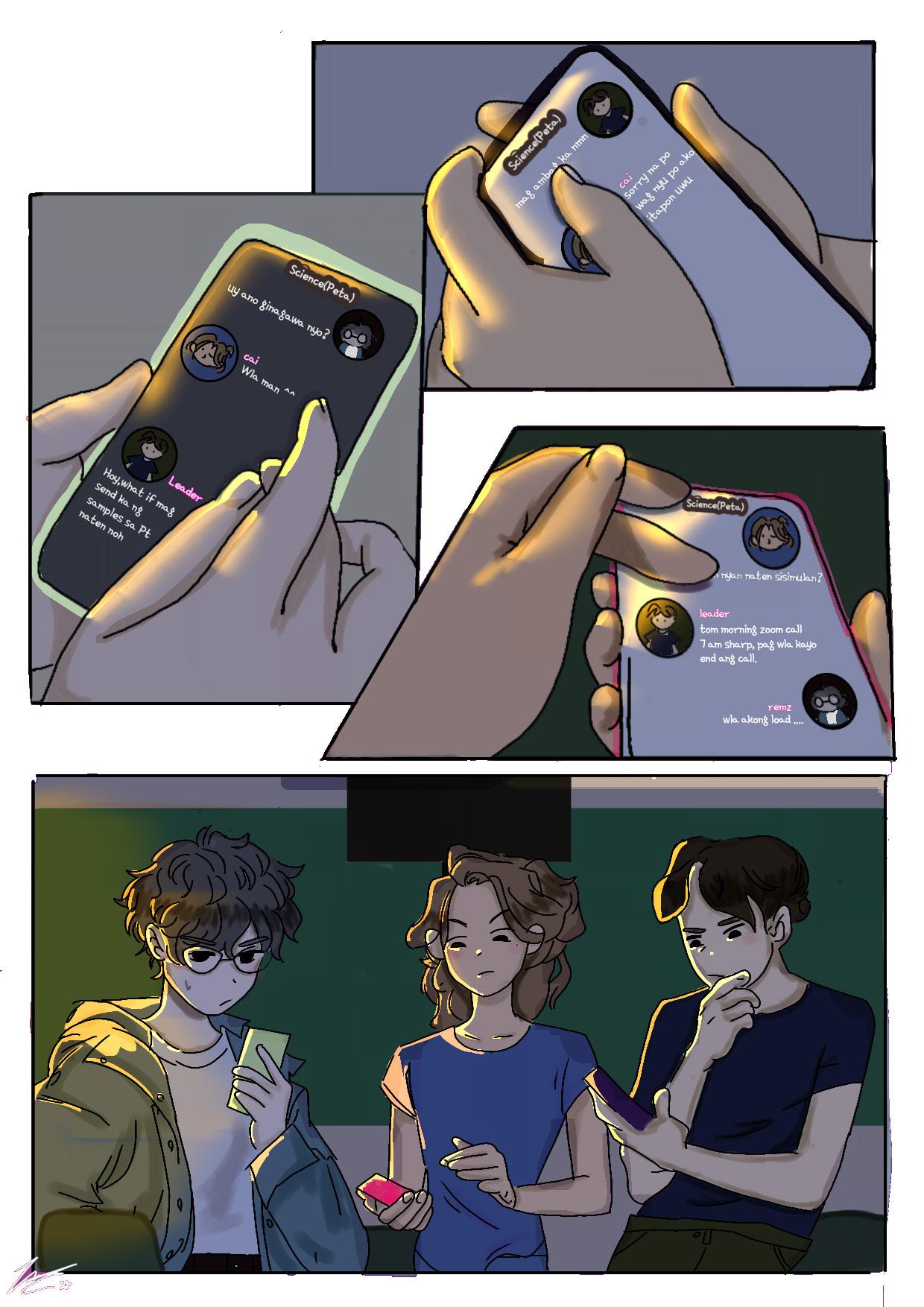
Tangled affection independent the ON e

You call me strong, you call me bold, The one you think who can stand alone, Yet in your praise, I feel the cold, As love is offered—never shown.
Their weakness draws your warmth like light, They fall, and you are there to catch, But I, who stumble in the night, Find no soft arms in my dispatch.
You think it can carry me, my strength, But even towers crack and break, I stand here, needing what they get, Yet you don’t see that I ache.
You praise the ways I lift myself, No hands extended, no cries out loud, And so, your love is given less, As though my pride forbids me bowed.
For me this strength has built this jail, A person wrapped in iron walls, But underneath, I’m just as frail, Just as in need when darkness calls.


ZHAIN TAMPUS LIAN LAMBANICIO
BUHAY BBHS
